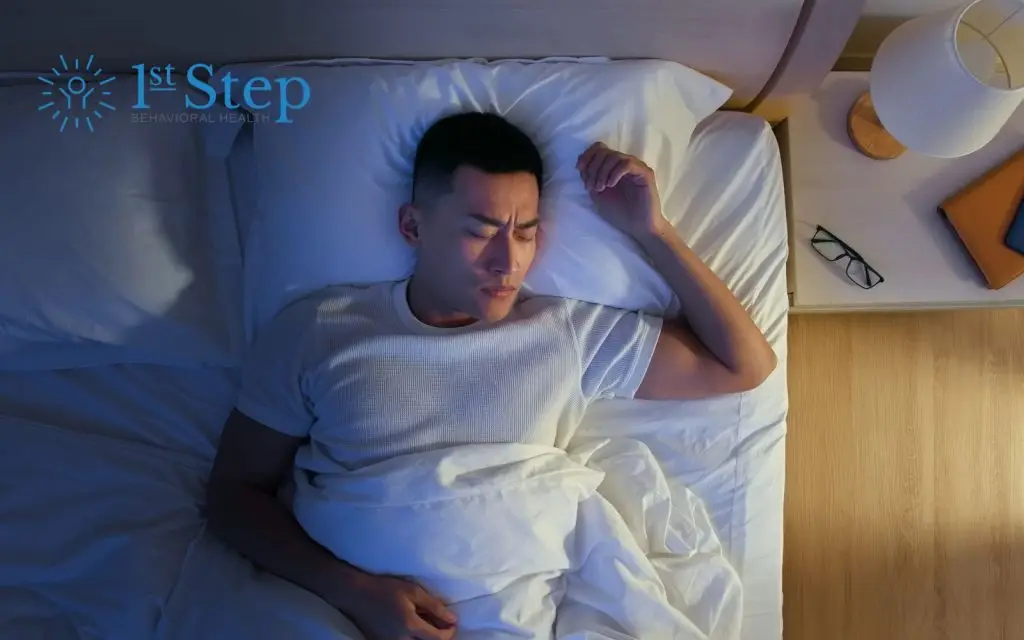Millions of people use THC products recreationally or for medical reasons. Marijuana is legal in many states, giving many people easy access to these products. Some people may use THC as a natural sleep aid. But is this effective or safe?
Some experts believe THC may have potential benefits related to sleep. However, there is some evidence that using cannabis for sleep can have short-term and long-lasting effects.
This article will explore the effects of cannabis on sleep. You will learn:
- The effects and risks of marijuana use
- How THC may affect sleep
- The potential risks of using THC before falling asleep
- How to recognize and treat THC addiction
- Where to find comprehensive treatment and recovery support
If you or someone you love struggles with cannabis use or addiction, you are not alone. Find comprehensive, compassionate treatment and recovery support programs at First Step Behavioral Health. Contact our treatment team today to learn more about our programs or schedule an intake appointment.
The Effects and Risks of Marijuana
Marijuana is a plant that contains a psychoactive chemical compound called tetrahydrocannabinol (THC). People may consume marijuana or THC by smoking, vaping, or consuming it in other products.
THC can cause significant physical and mental health effects. Some of the most common effects of THC include:
- Relaxation
- Increased hunger
- Euphoria
- Sensory perception changes
- Altered sense of time
Some people may experience unwanted side effects when using THC, including:
- Psychosis
- Anxiety
- Panic
Research from 2021 showed that over 52 million people in the United States used cannabis during the previous year. Since then, more people have gained legal access to THC as states have legalized it for medical or recreational use.
Understanding How THC Affects Sleep
People may use THC to resolve sleeping issues, including chronic pain or insomnia. Here are some of the reasons people may use THC to improve sleep.
Reduced anxiety
Anxiety can keep the mind racing throughout the night, making it very hard to fall asleep. People may use cannabis or THC products before bed to relax, making it easier to fall asleep.
Decreased pain
Studies suggest THC may reduce pain levels, allowing people with chronic pain or injuries to get restorative sleep.
Improve sleep cycles
Some research indicates that THC may help to increase the time spent in deep sleep.
Alternative to prescription drugs
Some people prefer to use THC before bed instead of prescription sleep aids. Some people believe cannabis is a safer alternative to prescription drugs and has fewer side effects.
Some people may think of THC as a safe, natural sleep aid. However, using high doses or using it frequently may have serious consequences for your health and well-being. Contact the First Step Behavioral Health team to learn about our substance abuse treatment and recovery programs.
Risks of Using THC for Sleep
Using THC for sleep has risks. Here is an overview of the potential complications of using THC for sleep.
Morning grogginess
THC may have short-term sedative effects that help people fall asleep quickly. However, some people may wake up with intense grogginess that impacts their daily functioning.
Worsening mental health symptoms
Prolonged marijuana use can have significant effects on a person’s mental health. It can worsen symptoms of depression, anxiety, and other mental health disorders.
Side effects
Marijuana abuse can have unwanted side effects, including:
- Dry mouth
- Faster heart rate
- Dizziness
- Anxiety
- Paranoia
- Confusion
People who use higher doses of cannabis may be more at risk of these and other side effects.
Disrupted sleep cycles
THC may help people fall asleep faster, but it can also disrupt sleep patterns. People may have longer periods in deep sleep and less time in REM sleep. Over time, this can cause people to wake up feeling unrested or groggy.
Dependence
People who rely on THC to sleep or use it frequently may develop symptoms of dependence, including:
- Needing to use more to get the desired effects (tolerance)
- Experiencing withdrawal symptoms if you stop using cannabis
- Feeling anxious if you cannot use THC before bedtime
- Doing risky things while high, like driving
- Having cravings for cannabis products
- Having social, legal, or financial trouble related to cannabis use
- Isolating more or neglecting responsibilities
It is essential to seek treatment and support if you have symptoms of cannabis dependence. Contact the First Step Behavioral Health specialists to learn about our programs or schedule an intake appointment.
Treating THC Addiction
It can be challenging to overcome THC addiction. People may struggle with cravings and withdrawal symptoms if they suddenly stop using it.
Treatment programs offer mental, physical, and emotional support to help people safely stop using marijuana and THC products. Treatment may include:
- A supportive medical detox program
- Medications to manage withdrawal symptoms
- Individual, group, and family therapy
- Relapse prevention education and coping skills
- Holistic therapies to soothe the mind and support overall health, including nutrition support, exercise, and mindfulness
- Aftercare planning
If you or someone you love needs treatment and support to overcome substance use disorder (SUD), you are not alone. Learn about the supportive treatment programs at First Step Behavioral Health or make an appointment by contacting us today.
References:
- AHAIASA Journals: Use of Marijuana: Effect on Brain Health: A Scientific Statement From the American Heart Association
- National Institute of Health (NIH): The Effects of Cannabinoids on Sleep
- Journal of Clinical Sleep Medicine: Cannabis and sleep disorders: not ready for prime time? A qualitative scoping review
- Science Direct: Study of the association between cannabis use and sleep disturbances in a large sample of University students
Jump to a Section
Call (855) 425-4846
